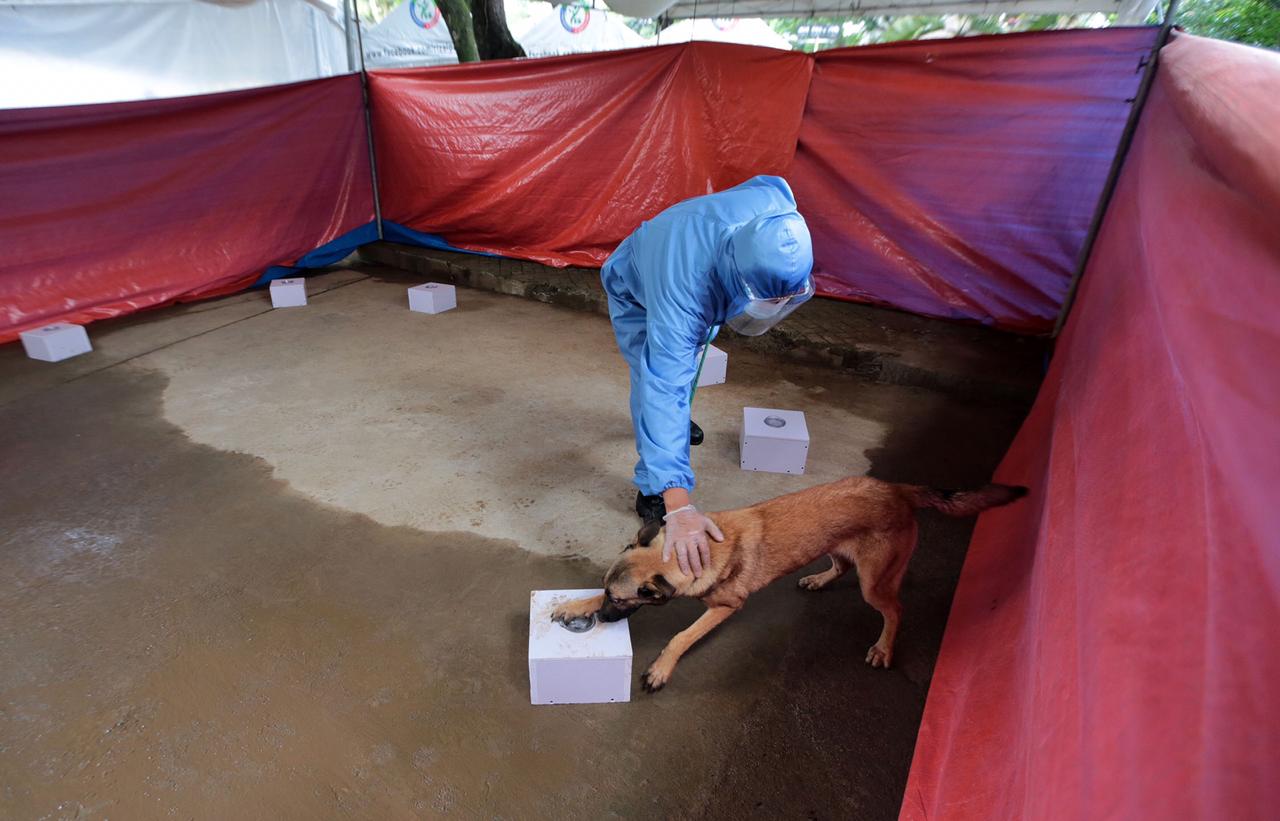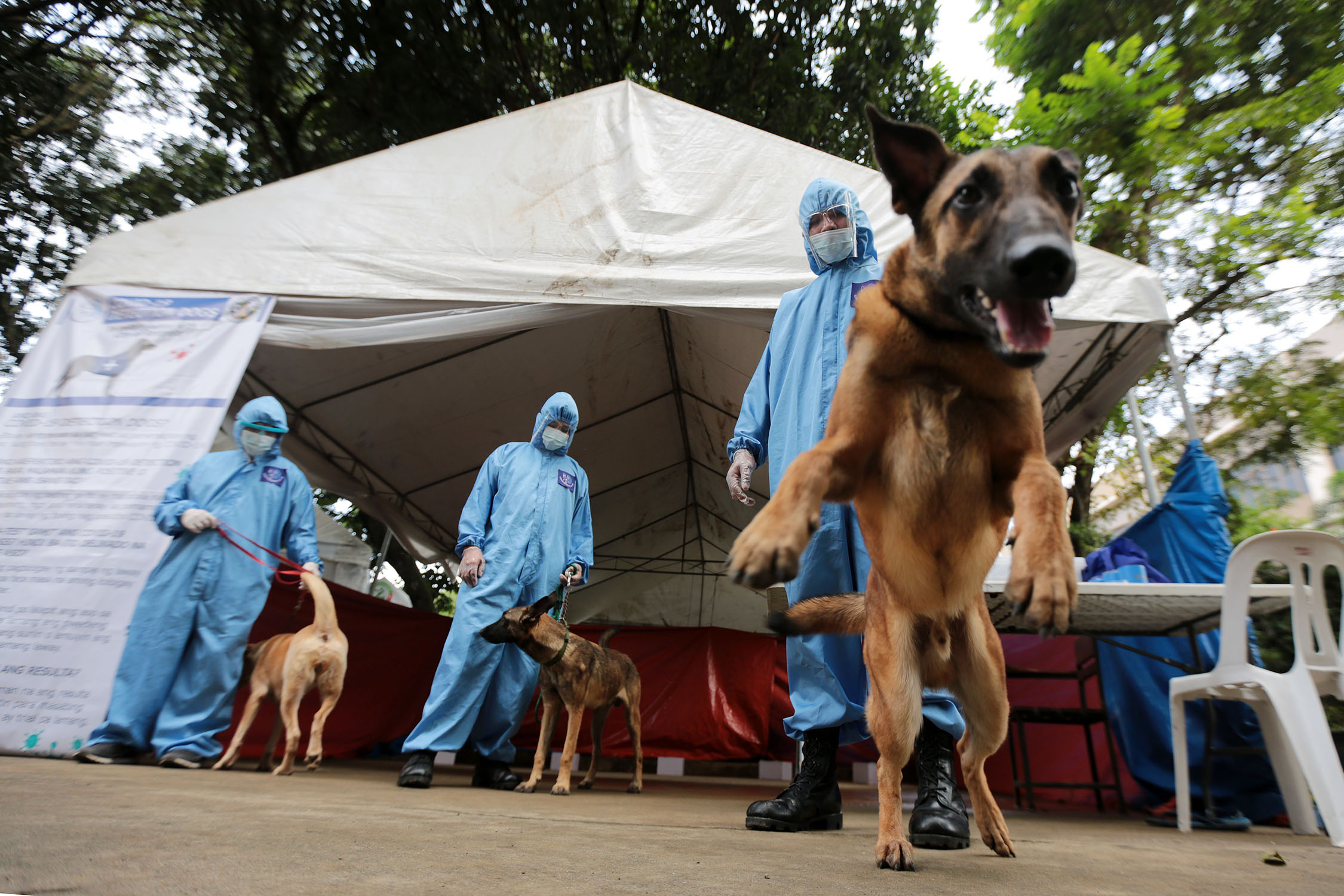Local K-9 team joins tests if dogs can sniff out coronavirus
They might soon give experts a hand—or a paw—in the complex and largely expensive process of finding out if you have COVID-19.
A K-9 team in the country is currently undergoing an accuracy test to determine their reliability in sniffing out the presence of SARS-CoV-2, the virus that causes the severe respiratory disease.
According to Ryia Tabares of Universal K9 Services Philippines, the “coronavirus sniffing dogs”—if proven to be up to the task—can reduce the need for repetitive testing especially in hospitals, malls and other areas where the transmission rate is high.
“It was borne out of a desire to help the country as well, and we hope the government can find use for this,” Tabares told the Inquirer.
She said her company started training dogs to sniff out the virus following similar projects initiated in other countries, such as Germany, Finland, the United States and the United Kingdom.
Accuracy rate
The Antipolo City-based company specializes in the training of dogs for narcotics and explosives detection, but the lockdown prompted by the pandemic made it rethink its business, she said.
“At the same time, we had 10 fresh [or untrained] dogs then, mostly Belgian Malinois,” she said.
In training since June, all 10 dogs have “passed” the initial, three-month program—wherein they are supposed to pick up the distinct body odors of a person infected with the coronavirus. The dogs are made to smell personal items that had been worn or used by the human subjects.
“We used masks, shirts and other articles of clothing from those who were known to have tested positive for COVID-19,” Tabares said.
She said the accuracy rate of Universal’s dogs had proven to be at par with the canines being trained abroad for the same purpose. “They haven’t failed yet in our small sample sets,” she said.

SENSE OF SMELL Dog handlers of security group Universal K9 Services Philippines train “Argus,” a Belgian Malinois, and other dogs in Antipolo City on Thursday. Second photo shows Argus being trained to detect the coronavirus in a sealed box containing an infected material. —PHOTOS BY GRIG C. MONTEGRANDE
BMC study
In a study released in July by the medical journal BMC Infectious Diseases, researchers found that trained dogs can distinguish who among individuals have tested positive or negative for the coronavirus.
The study said that “during the presentation of 1,012 randomized samples, the dogs achieved an overall average detection rate of 94 percent, with 157 correct indications of positive, 792 correct rejections of negative, 33 incorrect indications of negative or incorrect rejections of 30 positive sample presentations.”
This led researchers to conclude that volatile organic compounds produced during respiratory infections “can cause specific scent imprints, which can be detected by trained dogs with a high rate of precision.”
Tabares cited the need for a bigger sample size to affirm the accuracy of canine detection of the coronavirus.
Project with local gov’t
“We have reached out to the Antipolo local government to try this at a test center, to test the accuracy rate,” she said, referring to a joint project between Universal and City Hall that began on Oct. 30.
The target is for the dogs to go through 1,000 samples.
“We ask the subject to put the … used mask in a canister, and then we place that canister in a box, and the dogs can sniff the samples,” Tabares said.
When a dog detects the virus in the samples, it can convey the “positive” detection to its handler in several ways, depending on its training. It may scratch or tap the box with its paw, or just sit next to it.
Tabares said the company was hoping that more security agencies would conduct similar initiatives and that the national government would take notice.
“Hopefully we can place dogs at the entrance of malls or airports, then we wouldn’t have to require everyone to be tested, just the ones that the dog signals. That would definitely be more economical,” Tabares said.
DOH: Wait for studies
The Department of Health (DOH), however, said it would be best to wait for completed studies involving sniffing dogs before COVID-19 strategies are updated.
“It would be better if we would wait for the official results and recommendations of these studies before we introduce changes to our current policies,” the DOH said in a statement.
Countries such as Finland and the United Arab Emirates have started testing if dogs can detect the virus, with their trials still in pilot stages and mostly done at airports, it added.
At present, the DOH still considers RT-PCR (reverse transcription-polymerase chain reaction) test as the “gold standard’’ for COVID-19 diagnosis.
—WITH A REPORT FROM JOVIC YEE
For more news about the novel coronavirus click here.
What you need to know about Coronavirus.
For more information on COVID-19, call the DOH Hotline: (02) 86517800 local 1149/1150.
The Inquirer Foundation supports our healthcare frontliners and is still accepting cash donations to be deposited at Banco de Oro (BDO) current account #007960018860 or donate through PayMaya using this link.
